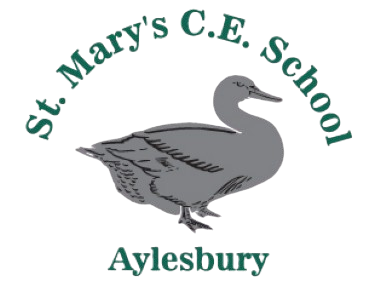Maths

"Arithmetic is being able to count up to twenty without taking off your shoes" - Mickey Mouse.
Intent
At St. Mary’s CE School, we aim to provide excellent maths education – teaching children the essential skills and knowledge to develop their deep understanding of this subject and to create curiosity, enthusiasm and a love for maths all whilst ‘Shining as Lights of the World’.
The 2014 National Curriculum for mathematics aims to ensure that all pupils:
-
Become fluent in the fundamentals of mathematics, including through varied and frequent practice with increasingly complex problems over time, so that pupils develop conceptual understanding and the ability to recall and apply knowledge rapidly and accurately.
-
Reason mathematically by following a line of enquiry, conjecturing relationships and generalisations, and developing an argument, justification or proof using mathematical language
-
Can solve problems by applying their mathematics to a variety of routine and non-routine problems with increasing sophistication, including breaking down problems into a series of simpler steps and persevering in seeking solutions.
Through our Maths provision, we intend to ensure that these skills are embedded within Maths lessons and developed consistently over time. We are committed to ensuring that all children recognise the importance of Maths in the wider world and that they are also able to apply their mathematical skills and knowledge confidently in a range of different contexts.
Through the use of the concrete, pictorial, abstract approach we make Maths accessible to all children, challenging the most able and supporting those with SEND. We believe mathematics should be fun as well as challenging for all pupils and want our pupils to experience success in the subject with the ability to reason mathematically.
Although the Maths curriculum is organised into distinct strands, pupils are encouraged to make rich connections across mathematical ideas to develop fluency, mathematical reasoning and competence in solving increasingly sophisticated problems. Wherever possible, they should also apply their mathematical knowledge to science and other subjects.
Implementation
Curriculum Implementation
At St Mary’s we follow the ‘White Rose Maths’ scheme to teach mathematics. This was introduced to all children in Summer 2023. The principles of White Rose Maths are being further developed to ensure the curriculum is fully implemented across all key stages.
What is White Rose Maths?
- White Rose is a maths curriculum that is challenging and coherently sequenced to allow all children to succeed.
- All maths content is carefully sequenced within the curriculum so that new knowledge builds on prior knowledge. This then allows children to remember and know more over time.
- White Rose Maths allows children to spend a greater amount of time building their number competency so that skills and knowledge are embedded into the children’s long-term memory
-
Maths is taught in a language rich environment, using a wide range of resources and practical activities to allow all children to explore concepts through a CPA (Concrete, Pictorial, Abstract) approach. We are developing a clear understanding of the value and importance of the CPA approach so that pupils experience maths in a variety of ways.
-
White Rose allows us to teach the key skills we want all of our children to be secure in but know that for those who are disadvantaged we need to build in a foundation of oracy, language acquisition, resilience and a growth mindset that enables children to believe that they can achieve.
Teachers enhance the programme with their own knowledge and expertise to further challenge the more able and to support children with SEND. Same day intervention and feedback underpins the approach to ensure children progress and gaps in knowledge and understanding do not emerge or widen.
Children of all ages and abilities are encouraged to use resources to develop and explain their mathematical understanding. Some examples of resources used across the school include: Numicon, Base 10, Counters and Cuisenaire Rods. Such resources support with the concrete representations and understanding of concepts throughout all key stages. Development into the pictorial representations across the school is achieved through Bar Modelling. This supports children with visualising concepts and problems at all ages and stages. Finally, children are encouraged to develop their abstract, written representations of mathematical concepts. The calculation policy is followed to ensure consistency throughout all key stages.
Children in all stages should apply their knowledge and understanding of maths across the curriculum to solve problems.
Curriculum Impact
Throughout each lesson formative assessment takes place and feedback is given to the children through marking and next step tasks to ensure they are meeting the specific learning objective. Teachers then use this assessment to influence their planning and ensure they are providing a mathematics curriculum that will allow each child to progress. The teaching of maths is also monitored on a termly basis through book scrutinies, learning walks and lesson observations.
Summative assessments are used to help the children to develop their testing approach and demonstrate their understanding of the topics covered. Teachers use a range of summative and formative assessment tools to determine children’s progress and attainment.
The expectation is that the majority of pupils will move through the programmes of study at broadly the same pace. However, decisions about when to progress should always be based on the security of pupils’ understanding and their readiness to progress to the next stage. Pupils who grasp concepts rapidly should be challenged through being offered rich and sophisticated problems before any acceleration through new content. Those who are not sufficiently fluent with earlier material should consolidate their understanding, including through additional practice, before moving on.
Maths Games and Activity Websites:
